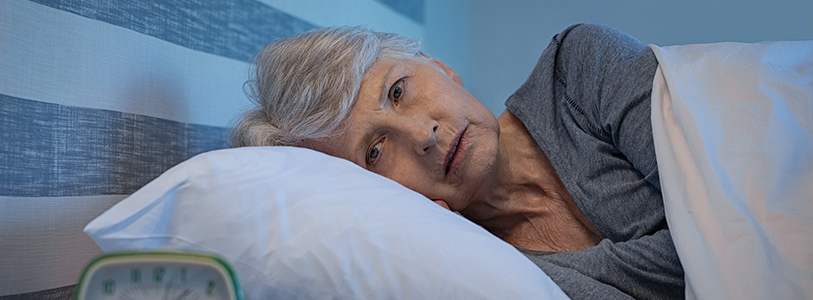A hard day’s night … warning signs you may have a sleep disorder

Good night … sleep tight? For people plagued with sleep disorders, a full night’s shuteye is hard to come by. Studies show that 50-70 million adults in the United States suffer from a sleep disorder, with insomnia topping the list of the most common, affecting one in every three people.
A sleep disorder is a problem related to sleep — either too much or too little, which affects a person’s daytime functioning. It can also be something about the quality of the sleep, which can be unrestful. The most common sleep disorder is insomnia, which is the inability to fall asleep or stay asleep. Sleep disorders can also include sleep apnea (pauses in breathing), nightmares, sleepwalking or talking, loud snoring, and restless legs (throbbing, pulling, creeping, or other unpleasant sensations in the legs and an uncontrollable urge to move them).
More articles from this issue
A sleep disorder can be caused by a host of factors. In some cases, it runs in the family; other times it can arise from increased levels of stress or some other psychological condition; in some cases, the condition develops as a result of unhealthy lifestyle choices. Sleep apnea, for example, is more common among patients who are obese or who smoke.
A restful night’s sleep is important to health and well-being. Without it comes such consequences as overtiredness, loss of energy, body aches, and a decline in cognitive function — all of which can affect relationships, temperament, performance, and health. It can put a person at risk of such physical complications as high blood pressure, heart disease, diabetes, weight gain, irritability, and substance abuse. Severe sleep deprivation can even lead to hallucinations. For all of these reasons, it’s important to address poor sleep patterns before they become a larger issue.
Nine signs of possible sleep disorders
- Routinely taking more than 30 minutes to fall asleep
- Constant feeling of tiredness and irritability during the day, even after getting seven or eight hours of sleep
- Awaking several times in the middle of the night and remaining awake, sometimes for hours
- Frequent and long naps during the day
- Difficulty concentrating at work or school
- Falling asleep at inappropriate times
- Loud snoring, breathing or gasping noises while you sleep
- Irresistible urge to move your legs, or a tingling or crawling feeling in the legs, particularly at bedtime
- Needing a stimulant, such as caffeine, to keep you awake during the day
Treatments
Sleep disorders are typically treated with behavioral therapy, lifestyle changes and, if necessary, prescription drugs. For example, cognitive behavioral therapy is considered the first line of treatment for people with insomnia and is geared toward establishing new and healthy sleep patterns by changing a patient’s negative sleep expectations. Sleep apnea can be treated in many different ways, such as CPAP masks (that supply constant and steady air pressure to the patient), nose pieces, or positional and oral appliances that are designed to keep the airway open during sleep. Surgical options are usually the last resort.”
A variety of medications are available to treat sleep problems, but doctors do not recommend them for use longer than a few weeks because of their addictive qualities. Over-the-counter (OTC) remedies can promote drowsiness, but they often come with side effects. Read the packaging carefully or seek advice from a medical professional or pharmacist.
What you can do to help yourself
- Be consistent: keep bedtime and wake time fairly consistent each day, including on weekends.
- Be active during the day: Aim for at least 20 to 30 minutes of vigorous exercise daily
- Limit caffeine and alcohol. They can make it more difficult to sleep.
- Create an atmosphere conducive to sleep: A warm bath, listening to soft music, and other relaxation techniques can help alleviate worries and promote sleep. Keep your bedroom temperature comfortable, cool, and dark, and avoid computer screens and electronics, which may hinder sleep.
To learn more about sleep disorders, visit our health library. To find a sleep medicine specialist, call 877-697-9355.






